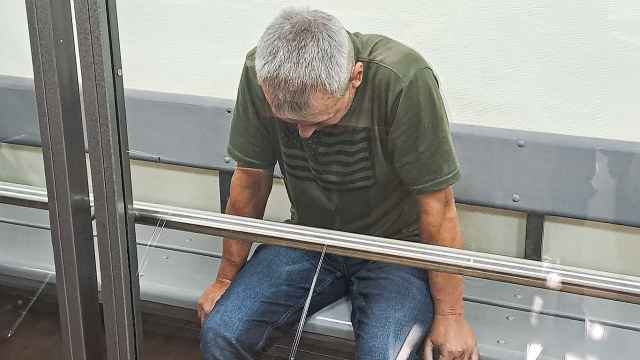The court marshal who oversaw City Hall's controversial demolishment of the Rechnik neighborhood last year has been beaten to death with a metal pipe outside his home in southwestern Moscow.
Pavel Gorbunov, whose court-ordered actions infuriated residents of the cottage settlement in southwestern Moscow, was struck at least three times on the head at about 6 a.m. Tuesday as he walked to his car from his house on Borovskoye Shosse, the Investigative Committee .
The unknown attacker fled with Gorbunov's briefcase and one of the three cell phones that he was carrying, the committee said in an online statement.
He also had Rolex watches and 500 euros in cash on him, Kommersant reported, citing police.
Gorbunov's body was found at 7:40 a.m. about 40 meters from his house, investigators said.
The motive for the killing was unclear Wednesday. Investigators said they were examining whether the attack was connected to Gorbunov's work or his private life.
The head of the Federal Court Marshals Service, Arthur Parfenchikov, praised Gorbunov as a top-notch court marshal and refused to speculate on why he had been attacked.
"He was one of the agency's most capable workers in Moscow," he said on the sidelines of a Justice Ministry roundtable.
Gorbunov, however, made enemies as he seized property from debtors and enforced other court rulings. Among those angry with him were no doubt the residents of Rechnik, which Yury Luzhkov's City Hall started razing in January 2010 after winning court decisions that the cottages were built there illegally.
Gorbunov also had been waging court battles against several companies, including banks and energy companies, that disagreed with his actions, RIA-Novosti .
While Gorbunov's death was not mentioned during the roundtable, Parfenchikov complained that court marshals responsible for escorting people under arrest are allowed to carry firearms but lack the status of law enforcement officers. He also said court marshals are not eligible for benefits and pensions like the police, causing many to quit after two to three years on the job.
"Our main problem is low salaries and status," he said.
He also said court orders for marshals to collect debts ranging from 1 kopek to 500 rubles from companies were not worth their time. "It is sad to order people to collect such miserable sums," he said.
Justice Minister Alexander Konovalov called for legislation Wednesday to control the country's growing number of collection agencies, which he said often work in a gray area in collecting debts.
Konovalov, who spoke at the roundtable and whose ministry oversees court marshals' work, said the activities of collection agencies hired by banks often "go too far."
A Message from The Moscow Times:
Dear readers,
We are facing unprecedented challenges. Russia's Prosecutor General's Office has designated The Moscow Times as an "undesirable" organization, criminalizing our work and putting our staff at risk of prosecution. This follows our earlier unjust labeling as a "foreign agent."
These actions are direct attempts to silence independent journalism in Russia. The authorities claim our work "discredits the decisions of the Russian leadership." We see things differently: we strive to provide accurate, unbiased reporting on Russia.
We, the journalists of The Moscow Times, refuse to be silenced. But to continue our work, we need your help.
Your support, no matter how small, makes a world of difference. If you can, please support us monthly starting from just $2. It's quick to set up, and every contribution makes a significant impact.
By supporting The Moscow Times, you're defending open, independent journalism in the face of repression. Thank you for standing with us.
Remind me later.





